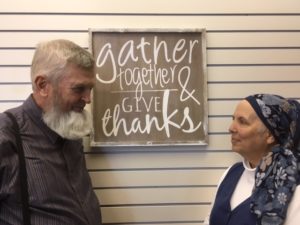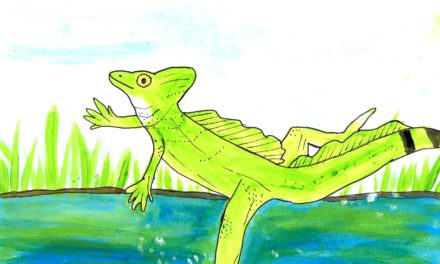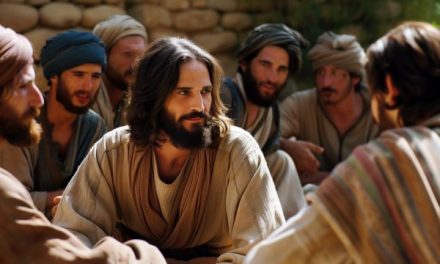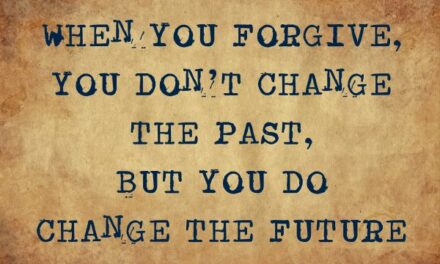Tabernacled Among Us
By Jim Huskins
McDowell County
Arguably, the most profound statement in literature is contained in John 1:14, “The Word became flesh and dwelt among us.” John the Apostle begins his Gospel account by vividly and passionately proclaiming that The Word existed with God from the beginning of all things and that The Word is God. In Colossians 2:9, Paul claims that “In him the whole fullness of deity dwells bodily.” How is it possible for the “whole fullness of deity” to clothe Himself in human flesh and dwell among us? More importantly, why would He choose to do so?
In John 1:14, the word translated “dwelt” is the Greek skenoo (skay-no’-o) It means to “tent” or “encamp.” The Hebrew antecedent of this word is mishkan (mish-kawn) which refers to a temporary shelter such as a shepherd’s hut or a tent. Mishkan is translated “tabernacle” when referencing the tent of worship built by Moses during the Hebrew Exodus.
The connection between the Wilderness Tabernacle and the Word becoming flesh is sublime. The Tabernacle was a temporary shelter blessed with Divine Presence. It was the centerpiece of the camp during Israel’s forty-year journey to the Promised Land. The human body occupied by Jesus was also a temporary shelter blessed with Divine Presence. Everything about the Tabernacle was a powerful foreshadowing of the life of Jesus. The depth and scope of that typology require—and deserve—extensive study. Both of these “tents” were used by God to dwell temporarily among His people.
But the fact that the Incarnation of Jesus was foretold through the Wilderness Tabernacle and many Hebrew prophecies still beg the question, “Why did He do it?” The limitations of our own “veil of flesh” make it unlikely that we could understand that answer even if it were divinely provided. We can, however, readily grasp one of the key factors that made the incarnation necessary. Part of Jesus’ mission was to become the “second Adam.” As a man, Adam sinned and died. Only as a man could Jesus correct Adam’s failure to become the mediator between God and man. Jesus had to become flesh because only flesh can die.
God’s unimaginable holiness requires that when someone sins, one must die. Each of us has sinned, and divine justice requires that we each must die. Jesus had to become flesh so that He could die in our place. His death had been foretold each spring for more than 1400 years as the Hebrews enacted the celebration of Passover. The blood of the Passover lamb was part of the process God used to free His people from slavery in Egypt. Egypt is often used in Scripture as a symbol of sin. Only by taking on flesh could Jesus become “the Lamb of God who takes away the sin of the world.” (John 1:29)
The incarnation of Jesus is commemorated by a Hebrew celebration with which most Christians are unfamiliar—Sukkot. One of the “Appointed Times of God” detailed in Leviticus, Sukkot takes place each fall. God commands that His people live for seven days in a “sukkah.” This is another Hebrew term for “tent” or “temporary shelter.” Scripture teaches that spending a week in a sukkah helps us to remember our journey from sin and slavery in Egypt to the freedom and abundance of God’s Promised Land. On this side of the cross, Sukkot also reminds us of the time Jesus spent in His tent of flesh.
The celebration of Sukkot is at the heart of a story we read in the 17th chapter of Matthew’s Gospel, Jesus took Peter, James, and John to the top of a high mountain. There they experienced what is known as the Transfiguration. This event explains a statement Jesus made in Matthew 16:28. “Some standing here will not taste death until they see the Son of Man coming in His kingdom.” Jesus’ three closest friends were allowed to see him as he will be when He returns.
They were, of course, not accustomed to seeing Him in glorified form. They were used to the “tent of flesh” He occupied while He lived among them. Despite Simon Peter’s awe and confusion as he witnessed the Transfiguration, some part of him realized that the vision of Jesus and Moses, and Elijah in divine visage was tied to the celebration of Sukkot. English translations usually say that Peter offered to build three “booths” or “tents.” What he proposed was building three sukkot (plural).
All of his life, Peter had journeyed to Jerusalem each fall and lived for seven days with his family in a sukkah. He knew that Sukkot pointed backward to the Exodus and also pointed forward to the coming of Messiah. He also knew that his friend, Jesus, was “the Messiah, the Son of the Living God.” What better service could he provide than creating space for Messiah, the great Hebrew lawgiver, and the greatest of God’s prophets to tabernacle together?
The early Church did not celebrate the birth of Jesus. If they had done so, it would not have been at the winter solstice. Every ancient culture celebrated the birth of their version of the pagan sun god at the solstice. The early Church would have celebrated Messiah’s birth at Sukkot. That’s when Israel had always celebrated the fact that God tabernacled among them.
Just as the Wilderness Tabernacle was a detailed prophecy pointing toward Messiah, the Feasts or Appointed Times proclaim Messiah’s advent. Jesus fulfilled and revealed the meaning of the Spring feasts during His first coming. We now know why we are privileged to celebrate Passover, Unleavened Bread, First Fruits, and Feast of Weeks. When He comes again, He will fulfill and reveal the Feast of Trumpets, Day of Atonement, and Sukkot. Jesus may have been born during Sukkot. The stable where Mary gave birth was likely a sukkah. What better occasion could He have chosen to take on a tent of flesh and dwell among us?
__________________________________________________
Jim & Beverly Huskins are members of Obedient Heart Fellowship in McDowell County. Beginning July 2, 2022 Obedient Heart Fellowship will meet at 10:00 Each Sabbath (Seventh Day) in space graciously shared by New Covenant Church in Christ. 2460 US 221 Business N. In Marion, NC. Call for info. 828-460-7913. You can read more good Christian news from Jim HERE.
__________________________________________________






